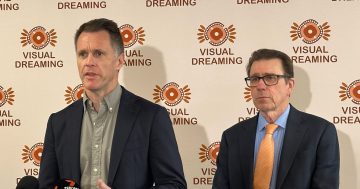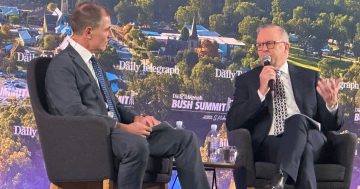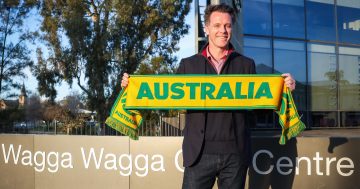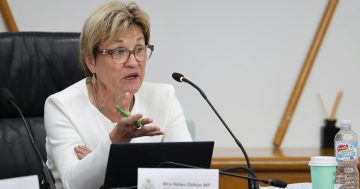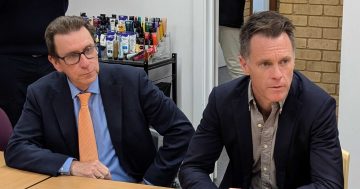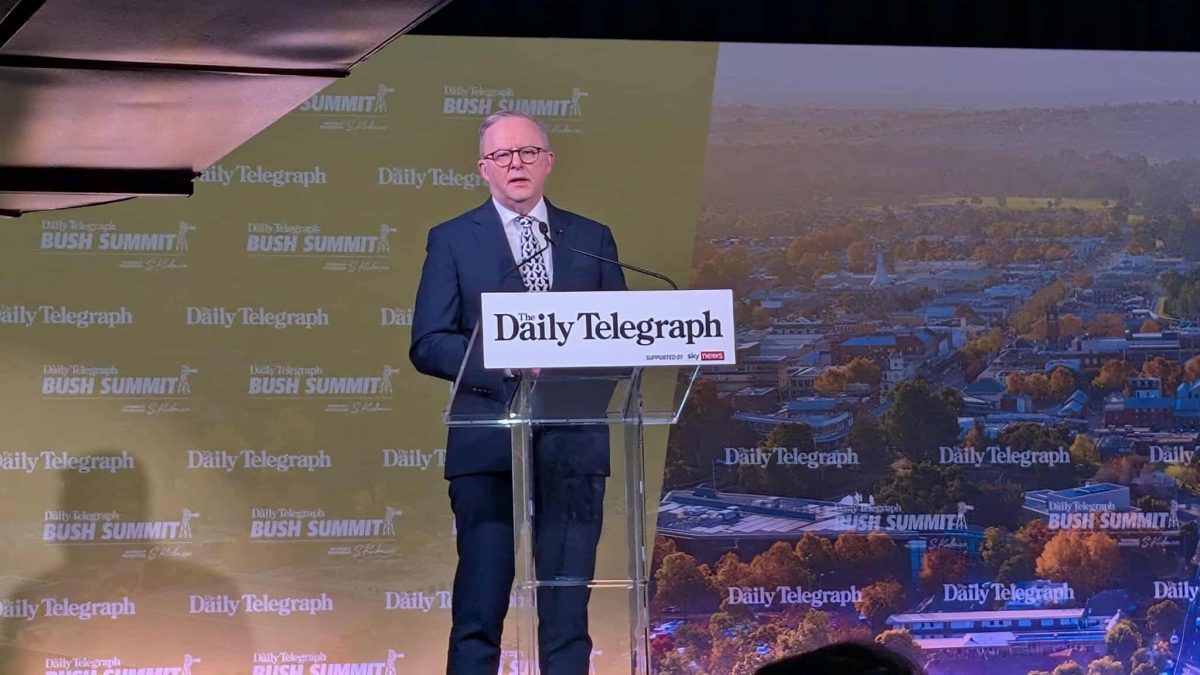
Prime Minister Anthony Albanese addressed the full summit for over 30 minutes, highlighting initiatives implemented by both the state and federal governments to support regional areas. Photo: Jarryd Rowley.
Prime Minister Anthony Albanese, Premier Chris Minns and several state MPs attended an annual Bush Summit on Wednesday, but declined to speak to a group protesting against solar farms or take questions from most local media outlets.
The event, held at Charles Sturt University, drew politicians and business leaders from around Australia, who gathered to discuss regional concerns.
Former Wagga councillor and farmer Mick Henderson was among the protesters outside the summit.
“The only person who got to ask questions was the host, who is the editor of a Sydney newspaper,” Mr Henderson said.
“There was no community voice there at all. And Albanese never spoke very much on the issue until he was questioned by the interviewers. It was all about money, grants, and what he’s doing here, there, and everyone else, and nothing around real, true issues that we’re facing here.
“The only minister that I, and a lot of the other protestors, got to speak to was Barnaby Joyce, who was the only one who seemed to be supportive of what we are doing.
“There was practically no talk about net zero at all, and it feels like the only way the government will respond is by throwing money at us to try and buy us out.”
Over the past few months, there have been several protests across the Riverina against renewable energy projects, with residents expressing concern about poor consultation from government, safety risks, devaluing property prices and wasting high value agricultural land.
Protestor and farmer Annette Wheaton said she invited NSW Premier Chris Minns to Oxley Bridge Road, in Uranquinty, to see where plans for a solar farm were laid.
“I’ve invited him out to come see, let’s hope he comes out so can understand why it’s not a suitable area for a solar farm.
“Aside from that small conversation, it was disappointing that we didn’t get to have any real conversation about renewable energy projects in the area.”
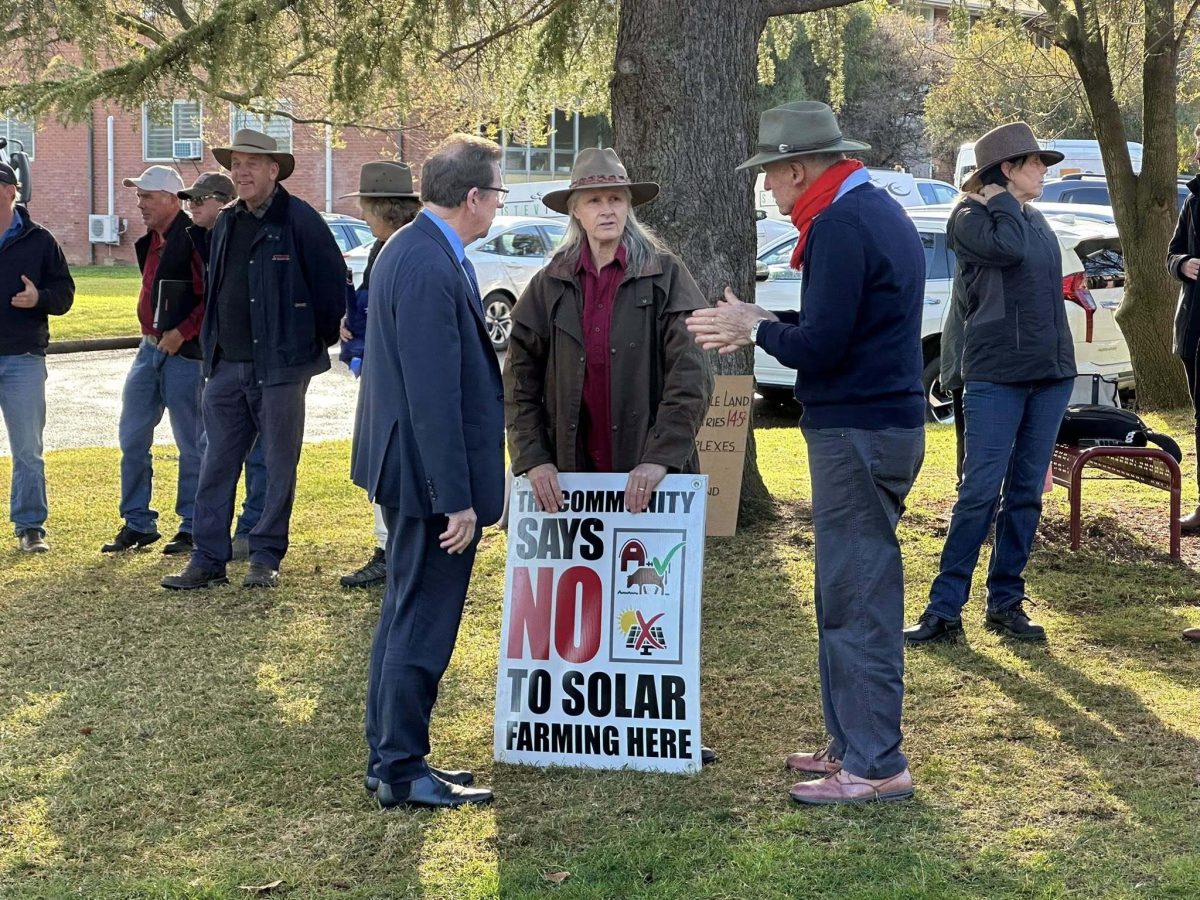
Protestors gathered outside the summit. Photo: Jarryd Rowley.
Region Riverina, among several other local media outlets, requested interviews with the Prime Minister, NSW Premier, and the Minister for Agriculture Tara Moriarty regarding local concerns; however these were denied.
It’s understood Ms Moriarty spoke only to the ABC.
Both Mr Minns and Ms Moriarty later announced via a press release that they would be convening a dedicated regional advisory group, called the Rural Remote and Regional Advisory Council (PRRRAC), that would meet twice annually with the Premier and Minister Moriarty.
Local farmer Paul Funnell attended the summit in support of changing the common trend of renewable energy projects appearing in the Riverina
“The whole thing should be scrapped. This whole march across the land is just absolutely destroying the farmland,” Mr Funnell said.
“It goes further than just the fact that it’s taking the farmland; we’ve lost property rights.
“Both governments have to accept they’ve made a mistake, and they have to withdraw from this area. This is outside of the renewable energy zone, not that I support them anyway, but if they designate them, that’s where they should stick to.”
NSW Nationals Leader and Minister for Dubbo Dugald Saunders attended the summit and echoed Mr Funnell’s calls, stating that the only active Renewable Energy Zone, the Central-West Orana Renewable Energy Zone, was within his electorate.
“I live in the only active renewable energy zone; my local area around Dubbo and Mudgee is where all the impact is currently being felt, but that will be felt elsewhere,” he said.
“The reality is, we don’t want to be the biodiversity offset for the city areas. We want proper consultation. We want proper ways forward.
“The cumulative impact in these areas is massive. From transmission lines to solar and wind to pumped hydro, you name it, everything that is going to happen has an impact on the community, and the government needs to do things properly. And at the moment, we’re seeing that it is not.”
Original Article published by Jarryd Rowley on Region Riverina.


